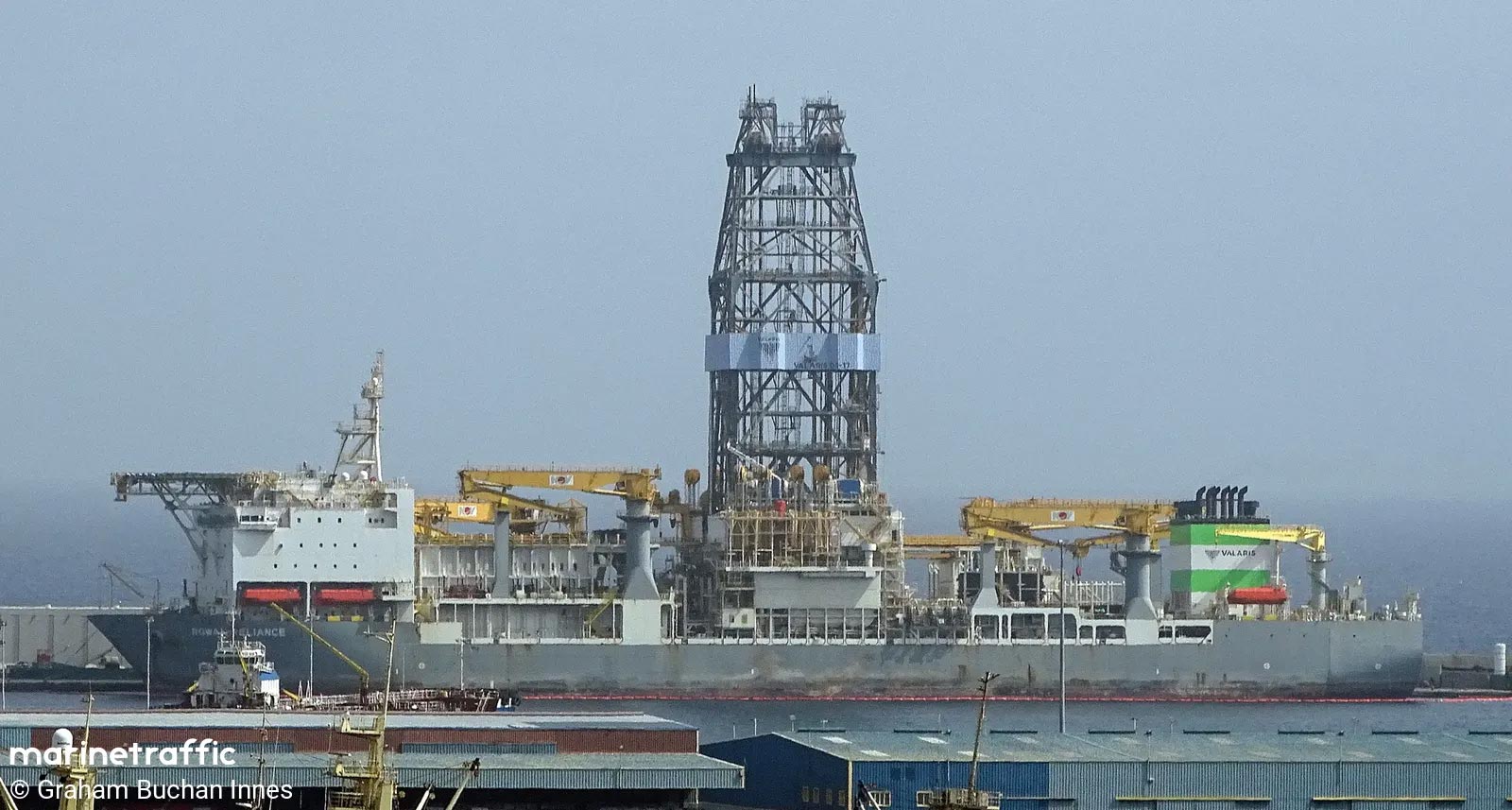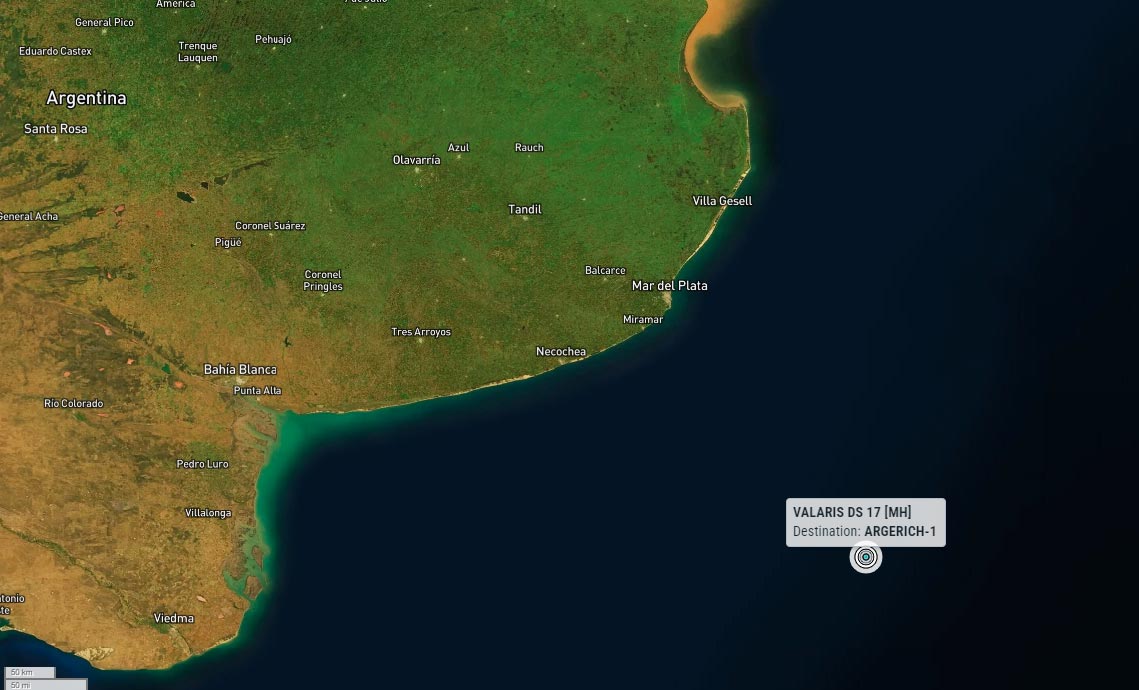
A few days ago, the activities of the Argerich Project began in the North Argentina Basin within the CAN-100 block (15,000 km2), which contemplates the execution of the first offshore exploratory well in deep waters off the coast of the province of Buenos Aires. This exploratory well complements the seismic surveys already carried out with the purpose of finding oil or gas in a place already considered favorable for the existence of hydrocarbons.
The company Equinor will be in charge of the operation. This well, which is expected to exceed 4000 meters deep under the sea. It will be drilled on the front of the continental slope, one of the most productive areas in the world, which supports a great diversity of species.
This exploratory drilling activity is the first physical intervention on the seabed of the area within the
process. The result of this well would indicate if there are commercial possibilities of extraction, and a series of drillings would continue with the objective of knowing the characteristics of the reservoir. Finally, after 7 or 8 years, it would be possible to establish an extractive exploitation operation. The commercial phase would be carried out well beyond the peak of the world demand for crude oil, established by the International Energy Agency for 2028 ( ¹). Oil for a world in full transition, with a high cost for a decreasing market and with a decisive footprint for the Argentine sea.
The area where it will be operating overlaps with habitats that are home to a great biodiversity and are the scene of important ecological processes such as the spawning of ecologically and commercially important species, the migration of squid, and the feeding of birds, turtles and marine mammals, including the southern right whale. Precisely because of their eco-systemic value, these same areas were identified as potential Marine Protected Areas by the National Ministry of Environment and Sustainable Development.
This is a region whose oceanographic dynamics and structure is strongly related to the encounter of two major ocean currents. In front of the Argentine shelf and on the continental slope, near 38° south latitude, the Malvinas Current and the Brazil Current converge in the so-called Confluence Zone, one of the regions of greatest energy concentration of all the world’s oceans, where the mixture of subtropical and sub-Antarctic waters, rich in nutrients, determines important physical-chemical gradients and favors the presence of high concentrations of nutrients of singular biological importance for the entire ecosystem.

Endangered Biodiversity
Equinor recognizes in its environmental impact study that in the event of a contingency, birds, mammals and sea turtles are exposed to “serious medium-term impacts for nationally protected species and several endangered species” (²).
This document elaborates on the effects, indicating the following possible consequences, depending on the species: (³)
Mammals:
- Suffocation (species with fur): irritation, inflammation, infection, asphyxia, hypothermia, reduced buoyancy and swimming ability.
- Ingestion: digestive complications, decreased chances of survival.
- Inhalation: respiratory system damage, disorientation, loss of consciousness, paralysis, pneumonia, death.
- Loss of habitat (seals, sea lions and walruses).
Birds:
- Suffocation: loss of habitat, reduced mobility (increased vulnerability), loss of buoyancy, hypothermia, death.
- Ingestion: organ damage, gastrointestinal irritation and ulceration.
- Inhalation: pneumonia and death.
- Development of deformities, decreased reproduction / irregular reproductive behavior.
This deepwater project carries enormous risks and recent history shows the impacts that the world’s oceans have suffered as a result of the search for and extraction of hydrocarbons.
A project rejected by the public
The Forum for the Conservation of the Patagonian Sea and Areas of Influence and its member organizations have participated in the public hearings held to date on this issue, making available to the authorities scientific reports that show the dangers of exploratory and extractive activities in the Argentine Sea (“Seismic Prospecting: Risks and Impacts in the Argentine Sea”).
Hundreds of thousands of citizens mobilize periodically throughout the country in the well-known “Atlanticazos”, demonstrating their opposition to the advance of offshore exploration and exploitation in the Argentine Sea and the failure of the authorities to comply with the commitments made to achieve carbon neutrality by 2050.
The atmosphere and the ocean can no longer support carbon dioxide emissions
The burning of fossil fuels (oil, gas and coal) is the largest source of carbon dioxide (CO2) emissions worldwide and the main cause of global climate change.
The fossil energy sector is responsible for almost three quarters of emissions and the global average temperature has risen by 1.1°C since pre-industrial times.
To keep the planet below the 1.5ºC increase, global CO2 emissions must be reduced by about 45% by 2030 (compared to 2010 levels) and carbon neutrality must be achieved by 2050. All commitments to which Argentina adheres within the framework of international agreements.
Some consequences of climate change:
*2023 recorded the maximum historical temperature at the ocean surface;
*The Arctic has already lost two-thirds of its ice volume;
*Without the oceans, the Earth’s temperature would have risen by 36ºC;
*The ocean currents of the Argentine Sea are being altered;
*In the most optimistic scenario, 90% of global coral reefs will be lost;
*The lives of countless species are in danger.
In this context, a political decision is needed to advance the energy transition. Scientific information is conclusive. From the Forum and its organizations we call for an urgent halt to the expansion of hydrocarbon activity in the Argentine Sea, promoting marine spatial management based on scientific knowledge and honoring the commitments made to counteract the climate and ecological crisis.
1- https://www.iea.org/news/growth-in-global-oil-demand-is-set-to-slow-significantly-by-2028
2- I.A: Pozo Argerich RE-2021-109638795-APN-DTD#JG Page 139 of 372
https://www.argentina.gob.ar/ambiente/cambio-climatico/equinor-can-100-pozo-argerich#2
3- I.A: Pozo Argerich RE-2021-109638795-APN-DTD# Section 3 chapter 28 Item 6.4.5 Page 199 https://www.argentina.gob.ar/ambiente/cambio-climatico/equinor-can-100-pozo-argerich#2